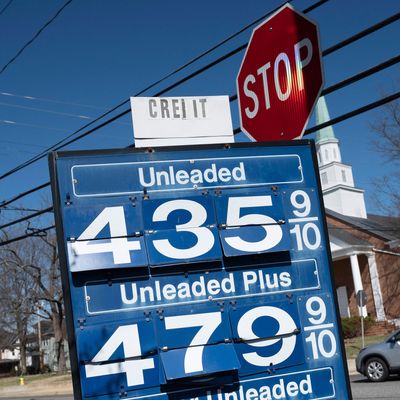
Democrats were already facing a dismal midterm environment. Now they must contend with being the party in power as gas prices surge well beyond $4 a gallon. The timing is particularly punishing because anemic demand for oil in the early months of the pandemic temporarily made gas incredibly cheap. Republicans, disingenuously, can point to the recent days of the $1.80 gallon and attack Democrats for making life far more expensive two years later.
Gas prices were rising before Russia’s invasion of Ukraine, but the spike now threatens to derail what has been a significant economic recovery from the depths of COVID. A $5 gallon could wipe out wage gains and prolong inflation. Joe Biden and the Democrat-controlled Congress should not be blamed for any of this — Russia’s invasion, a rising demand for gas, and a shale driller pullback are at the root of the surge — but voters will be in a restive mood come November. Democrats, inevitably, will suffer.
What can be done? In New York, progressives and moderates alike are considering a fairly drastic measure: suspending the state’s gas tax starting in May and extending through the end of the year. Other legislatures are weighing similar ideas — Maryland is on the brink of action — but New York could get there before many, with a new budget due in April. Suspending the gas tax would bring tangible relief to motorists, since it currently accounts for 48 cents per gallon of the high prices they’re paying. Gov. Kathy Hochul, though wary of pulling the trigger, may accede to legislative demands in an election year. And there’s no denying that the move would be incredibly popular.
As antithetical as it may be to their values, progressives and environmentalists should back a gas-tax holiday in New York and support a similar national effort. The reasoning is simple enough: Only one party cares about any policy priorities, and that party is endangered. If Republicans gain ground in New York while flipping the House and Senate, all plans to combat climate change are put on hold indefinitely. Mitch McConnell and Kevin McCarthy will roadblock Biden through 2024, hoping enough legislative defeats can pave the way for a second Trump term, or Ron DeSantis, or some other retrograde president. The rest of the 2020s would look quite grim.
It may well be true that nothing Democrats do will save them from enormous losses in November. Such nihilism, though, shouldn’t deter politicians and activists from fighting to do what they can to stave off defeat.
This is especially true for the center-left liberals and progressives who believe the Republicans are little more than a reality-denying Trump cult, prepared to obliterate the republic. If you are the kind of person who believes, genuinely, that Trump and the Republicans will kneecap democracy for good, you should be willing to do anything to save it. That starts with lowering gas prices.
And even if you aren’t the sort who holds such an apocalyptic worldview, it’s easy enough to see how temporarily pushing down gas prices would make sense. If the state legislature suspends the gas tax, every single Democrat seeking a House seat in New York — and the many State Senate candidates attempting to safeguard the majority there — could claim, credibly, that they belong to a party that brought immediate relief to people in their districts. Political polarization lessens the ability of politicians to tout local gains, but TV ads reminding voters, ad nauseam, that Democrats are the party of lower gas prices could matter in tight contests.
There are major drawbacks to a gas-tax holiday, and they shouldn’t be ignored. New York State collects $2 billion a year from the tax; these funds are used for roadways, bridge maintenance, and various other infrastructure needs. And lawmakers must be disciplined about not making a suspension permanent. If the Ukraine war ends in the next weeks or months, gas prices could fall enough to make the eventual return of the tax politically palatable, but that’s hardly a given. (Oil prices have actually fallen in recent days despite the war, though they remain quite high.) But as long as this is only a temporary measure, a $2 billion hit to a budget that will surpass $200 billion, amid the state’s surprisingly healthy fiscal environment, should be manageable.
Environmentalists and mass-transit advocates are correct that government, in general, should not be incentivizing driving or offering bailouts to motorists. And other federal policies must be explored, like buying oil from Iran and Venezuela and negotiating more aggressively with oil-producing Gulf States. Investing in public transportation, long-term, must be New York and America’s priority. America needs a green industrial policy that transitions us to renewable energies and frees us from the grasp of petro-states.
What city-based progressives and pundits shouldn’t forget, however, is that many, if not most, working-class and poor Americans drive cars and live in areas without any adequate trains or buses. The suburban and rural poor drive to work. Even in transit-rich New York City, working-class outer-borough neighborhoods are filled with automobiles. Large chunks of the city are not reached by subway at all. Bus service is spotty. Everyone deserves a bailout — in an ideal world, taking the train or the bus wouldn’t cost anything at all — but politicians operate under constraints. If a gas-tax holiday can help people in a highly visible way, without blowing a hole in the state budget, it must be strongly considered. In this precarious moment, Democrats need victories where they can find them.





























